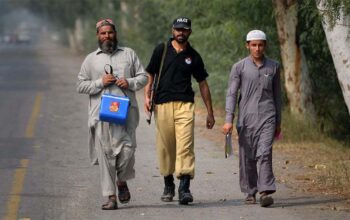By Staff Reporter
KARACHI: The central bank of Pakistan raised its key interest rate by 100 basis points to 21 percent on Tuesday to contain inflation, which remains at red-hot levels.
While consumer price increases are plateauing, they remain elevated, according to the bank’s monetary policy statement. Inflation rose further to 35.4 percent in March 2023, and the bank expects it to remain high in the near term.
This decision marks the highest key rate since central bank data was first recorded in 1956.
In announcing its latest policy decision, the State Bank of Pakistan scaled back to a 100 basis point rate increase after a year of larger hikes and swept aside in its statement the long list of reasons, from global financial crisis to the falling foreign currency reserves, that were driving prices higher to say simply that “inflation has plateaued.”
“The Monetary Policy Committee (MPC) considers this move to be a crucial step in anchoring inflation expectations around the medium-term target,” the statement said. “Achieving price stability remains a key objective, and the MPC views today’s decision as a significant step in achieving this goal.”
In March of last year, the bank raised its policy rate by 300 basis points to 20 percent to meet a key requirement of the International Monetary Fund (IMF) for the release of pending bailout funds.
The IMF loan program has yet to materialize, even though the country has raised taxes and energy prices, and allowed the currency to depreciate to meet the fund’s conditions.
The Washington-based lender has asked Pakistan to seek commitments from Saudi Arabia and the United Arab Emirates before it revives the bailout.
The current monetary policy stance is appropriate, according to the central bank, and, along with previous monetary tightening, will help achieve the medium-term inflation target over the next eight quarters.
“However, uncertainties associated with global financial conditions and the domestic political situation pose risks to this assessment.”
National CPI inflation increased to 35.4 percent in March 2023, resulting in average inflation of 27.3 percent during Jul-Mar FY23. The surge in inflation was broad-based, with food and energy components contributing significantly.
This reflects the pass-through of increases in taxes and duties, unwinding of untargeted energy subsidies, and the recent exchange rate depreciation. Core inflation has risen to 18.6 percent in urban and 23.1 percent in rural baskets, indicating the second-round impacts of the above-mentioned adjustments.
The central bank noted that the incoming data on economic activity continues to reflect a broad-based slowdown, with significant declines in sales volumes of automobiles and POL in recent months.
Similarly, the contraction in large-scale manufacturing (LSM) accelerated in January to 7.9 percent y/y.
Cumulatively, LSM output is down by 4.4 percent during Jul-Jan FY23 compared to the corresponding period of last year. In agriculture, cotton arrivals remain as per expectation; however, wheat production targets are likely to be missed.
The current account saw a deficit of only $74 million in February 2023, and the cumulative deficit now stands at $3.9 billion in July-Feb FY23, approximately 68 percent lower than the same period last year.
Despite the lower current account deficit, higher loan repayments relative to disbursements are keeping foreign exchange reserves under pressure. “Therefore, the committee reemphasized that the early conclusion of the 9th review under the IMF program is critical to rebuilding FX reserve buffers.”
Copyright © 2021 Independent Pakistan | All rights reserved




